Ziziphus spina-christi
Ziziphus spina-christi, known as the Christ's thorn jujube, is an evergreen tree or plant native to northern and tropical Africa, Southern and Western Asia. It is native to the Levant, East Africa, Mesopotamia and some tropical countries.[2] Fruit and leaves from the tree were used in preparing ancient Egyptian foods and cultural practices.
| Ziziphus spina-christi | |
|---|---|
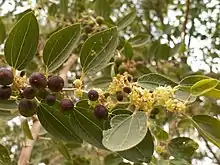 | |
| Scientific classification | |
| Kingdom: | Plantae |
| Clade: | Tracheophytes |
| Clade: | Angiosperms |
| Clade: | Eudicots |
| Clade: | Rosids |
| Order: | Rosales |
| Family: | Rhamnaceae |
| Genus: | Ziziphus |
| Species: | Z. spina-christi |
| Binomial name | |
| Ziziphus spina-christi | |
| Synonyms[1] | |
| |
Ecology
In the Levant, it grows in valleys up to an elevation of 500 m,[3] and is drought tolerant and very heat-resistant.[4] The ripe fruits are edible.[5] The seed, contained within a small, oblong woody pit, is opened and eaten by local fauna, including the rock hyrax.
Cultural and religious references
In the Levant and wider Middle East it is called sidr (associated with the lote tree of the Quran) and is common in the Jordan Valley and around Jerusalem,[6] as well as in the Hajar Mountains of the Sultanate of Oman.[7] There were some folklore traditions that said the trees were protected by benevolent spirits or dead saints. According to Abd al-Aziz Ibn Baz, the leaves of the tree are also useful in curing magic-induced ailments in Islamic traditions.[8] By some traditions, it was the tree from which Jesus' crown of thorns was made.[9] Matthew George Easton argues that Z. spina-christi is too brittle to be bent into a crown, and suggests another local plant, Ziziphus lotus.[10]
The oldest known Z. spina-christi is located in Ir Ovot, in the south of Israel.[11] It is estimated to be between 1500 and 2000 years old.[12][13] It is believed locally to be the very tree from which Jesus' crown of thorns was made.[14] It is the national tree of Qatar and the symbol of the central Arava.
Gallery
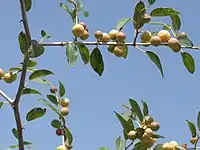 Z. spina-christi fruit, in Israel
Z. spina-christi fruit, in Israel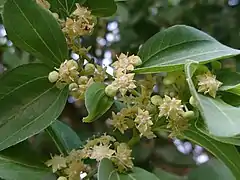 Z. spina-christi blossom, Behbahan, Iran
Z. spina-christi blossom, Behbahan, Iran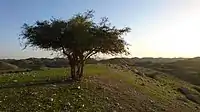 Wild Z. spina-christi tree in Iran
Wild Z. spina-christi tree in Iran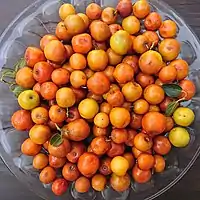 Z. spina-christi fruit, Behbahan, Iran
Z. spina-christi fruit, Behbahan, Iran
References
- The Plant List: A Working List of All Plant Species, retrieved 30 January 2016
- Orwa; et al. (2009). "Zizyphus spina-Christi" (PDF). 5Agroforestry Database 4.0. Archived from the original (PDF) on 2015-02-12.
- Zohary M. (1972). Flora Palaestina. II. Jerusalem: The Israel Academy of Science and Humanities. pp. 307–308. Cited in Amots Dafni; Shay Levy & Efraim Lev (2005). "The ethnobotany of Christ's Thorn Jujube (Ziziphus spina-christi) in Israel". J Ethnobiol Ethnomed. 1: 8. doi:10.1186/1746-4269-1-8. PMC 1277088. PMID 16270941.
- World Agroforestry Centre. Zizyphus spina-christi. Retrieved on 31 May, 2023
- Reinhard Fichtl. "Christ's Thorn - Ziziphus spina-Christi". Bees for Development. Archived from the original on April 24, 2010.
- Easton (1893), p. 688, "It overruns a great part of the Jordan valley."
- Lancaster, William (2011). Honour is in contentment : life before oil in Ras al-Khaimah (UAE) and some neighbouring regions. Lancaster, Fidelity. Berlin: De Gruyter. p. 137. ISBN 978-3-11-022340-8. OCLC 763160662.
- "حقيقة وقوع السحر وكيفية علاجه". binbaz.org.sa.
- "Ziziphus spina-christi". Flowersinisrael.com. Retrieved 2015-03-09.
- Easton (1893), p. 174.
- Bar-am, Aviva; Bar-am, Shmuel (15 November 2014). "Rooted in Israel's history, five remarkable trees". Times of Israel.
- "The "old man" of Hatzeva – the jujube tree at Hatzeva Spring". www.moag.gov.il. Ministry of Agriculture & Rural Development.
- Grossman, Michelle Malka (24 January 2016). "Israeli trees get IDs with interactive heritage project". The Jerusalem Post. Retrieved 27 October 2019.
- Sutton, Candace (20 April 2019). "The real story of Jesus Christ's crown of thorns". news.com.au. Retrieved 27 October 2019.
Bibliography
- Easton, M.G. (1893). Illustrated Bible Dictionary and Treasury of Biblical History, Biography, Geography, Doctrine, and Literature: With Numerous Illustrations and Important Chronological Tables and Maps. London, Edinburgh and New York: T. Nelson and Sons.
- Ziziphus spina-christi in West African plants – A Photo Guide.